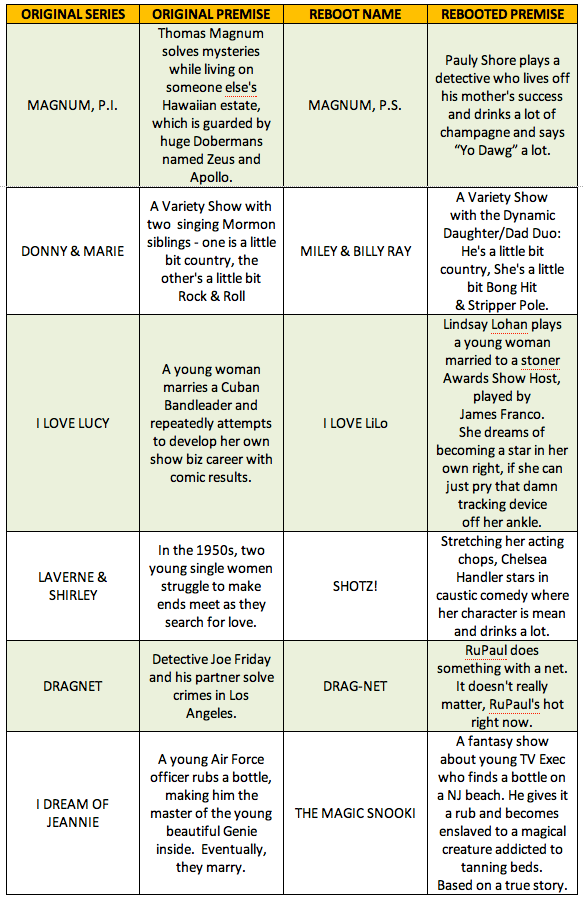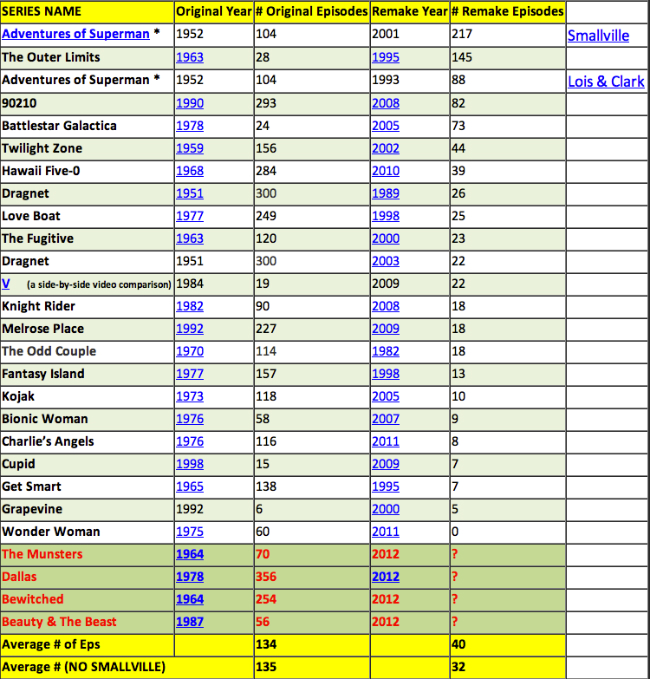Let me make one thing clear: I really liked the remake of Battlestar Galactica. Seriously, I did. OK? Now that that's out of the way, here is this week's hypothesis:
TV Remakes Are Bad Mojo.
It's not that I think producing series that have already been made shows a lack of originality or ambition (which I do). It's not that rehashing shows from the past reduces the chances for new; unique ideas to succeed (which it does). It's not even that I intensely dislike almost all of the TV that has ever been remade (before you set your Tweet to stun, see the BSG comment above).
I claim that TV Remakes are bad juju, because I have done the research, and it is simply, conclusively, unquestionably, factually true. Skeptical? Here is a chart laying out the historical success/failure rate of TV Remakes, show by show:
Notes: I have run the data two ways -- with and without Smallville. With Smallville, the data is terrible. However, unlike Lois & Clark, Smallville is not really a remake of The Adventures of Superman -- it's an extension of the Comic Book and Film franchise. Without Smallville in the calculation, the results are even more dire; 20 percent worse, in fact.
The only other valid successes on the list are Battlestar and Outer Limits. The first was so well made it eradicates all memory of the original, and is therefore an exception. The latter was both syndicated and Canadian -- therefore, irrelevant.
Lastly, this is not an analysis of adaptations of TV series from other countries. The history of foreign transfers -- from All In The Family to The Office -- is significantly more storied and successful. No, this analysis and critique is limited to recycled series and ideas.
With OR without successful exceptions, the data is crystal clear. STATISTICALLY SPEAKING, TV REMAKES FAIL. This has nothing to do with artistic merit, critical acclaim, audience reaction or personal taste. Audiences reject them, and then they get cancelled -- assuming they even make it to air. The success-to-failure-ratio of TV reboots is so obviously abysmal, one can only wonder: How do they keep getting green-lit? Is this the first time this analysis has been done? (It isn't. Even on HuffPost.)
Knight Rider crashed. Charlie's Angels fell to earth. Wonder Woman... wasn't. You'd think as an industry we would get the message. (Ok, Hawaii Five-O is making it so far. But isn't that really just NCIS with a great theme song?) Yet, at this moment, there are no fewer than four major remakes planned for the 2012-2013 season.
On more than one occasion, I've used this space to show that we are in a golden era of television. From drama to comedy to animation and (yes) even reality, there is more good stuff on TV now, than at any point in its history. Beyond that, there are also hundreds of scripts and pilots that never make it to air -- NEW ideas, from new voices, with new perspectives, that die in development.
Despite ALL that, someone, somehow still decided to remake The Munsters. Seriously. The Munsters. This is happening.
Look, Brian Fuller (re-creator of The Munsters) is enormously talented. I was a big fan of his last show, Pushing Daisies -- it was a smart, funny, innovative series that should have run much longer (and on cable, might have). I am sure Fuller will endeavor to make The Munsters as interesting as possible (you have no idea how hard it was to type that sentence). In fact, to show just how fresh and edgy it will be, he's renamed it -- now it's called Mockingbird Lane! (If you pitched this as a plot for Entourage, I'm pretty sure you'd be told it was too far-fetched).
Am I crazy? Does this not scream "BAD IDEA, GO BACK!"?! If you want the show to be so different from the original, why remake it? Are there no original scripts to produce? No NEW characters to develop? DOES TELEVISION REALLY NEED EVEN MORE VAMPIRES? Oh, and by the way, look at the chart!
As previously mentioned, I see Battlestar as an exception. Earlier this season, we even paid homage to Ronald Moore and Commander Adama on a very special episode of Portlandia (One Moore Episode). But one remarkable outlier does not mitigate the fact that the millions of dollars spent recreating old series, diverts resources from new shows that -- even in failure -- are additive to the medium (see: Pushing Daisies). Reheated leftovers send a message that our industry is out of ideas. Worst of all, it flies in the face of substantial, overwhelming and irrefutable data. By a factor of 6 to 1, remakes do not work.
TV is taking more chances than ever. It attracts the best and brightest talent, it takes the greatest creative risks and it is the only popular medium consistently increasing audiences year after year. Not only are smart, complex series like Homeland, Louie, Breaking Bad and Downton Abbey getting on TV, they're finding sizable audiences. Why, then, does the industry feel compelled to play it safe -- dusting off old titles and recycling old ideas? More confusing, why do we think this IS safe, when all available evidence says otherwise?
After a movie remake JUST failed, how do you explain the upcoming remake of Bewitched? "Here's the pitch: Samantha Stevens IS Hermione Granger!"
So, why do I care? First, I needed a subject for this week's piece, and The Munster's announcement got me all wound up. Second, I have a real fear that the creative sloth that gave us Andy Dick in Get Smart; Robert Urich in Love Boat; and now promises us The Munsters without Fred Gwynn puts the industry's success at risk (Am I overreacting? For a cautionary tale, see the Domestic Movie Box Office). In a cluttered landscape of nearly limitless entertainment choices, the only way to keep viewers coming back is to continue taking risks and advancing the art-form.
Conventional Wisdom says that remakes come with "built in brand awareness" and "ready-made goodwill"; it will tempt you with "proven success" and "well established characters." Please, don't take the bait. THE DATA SPEAKS FOR ITSELF: THOSE WHO IGNORE THE HISTORY ARE DOOMED TO REPEATS.
Bonus: During my research, I unearthed even more information on potential future remakes (future remake is literally an oxymoron). Below is a chart containing six elevator pitches for new TV Reboots (new reboot: another oxymoron). Look for them soon on a TV near you.

